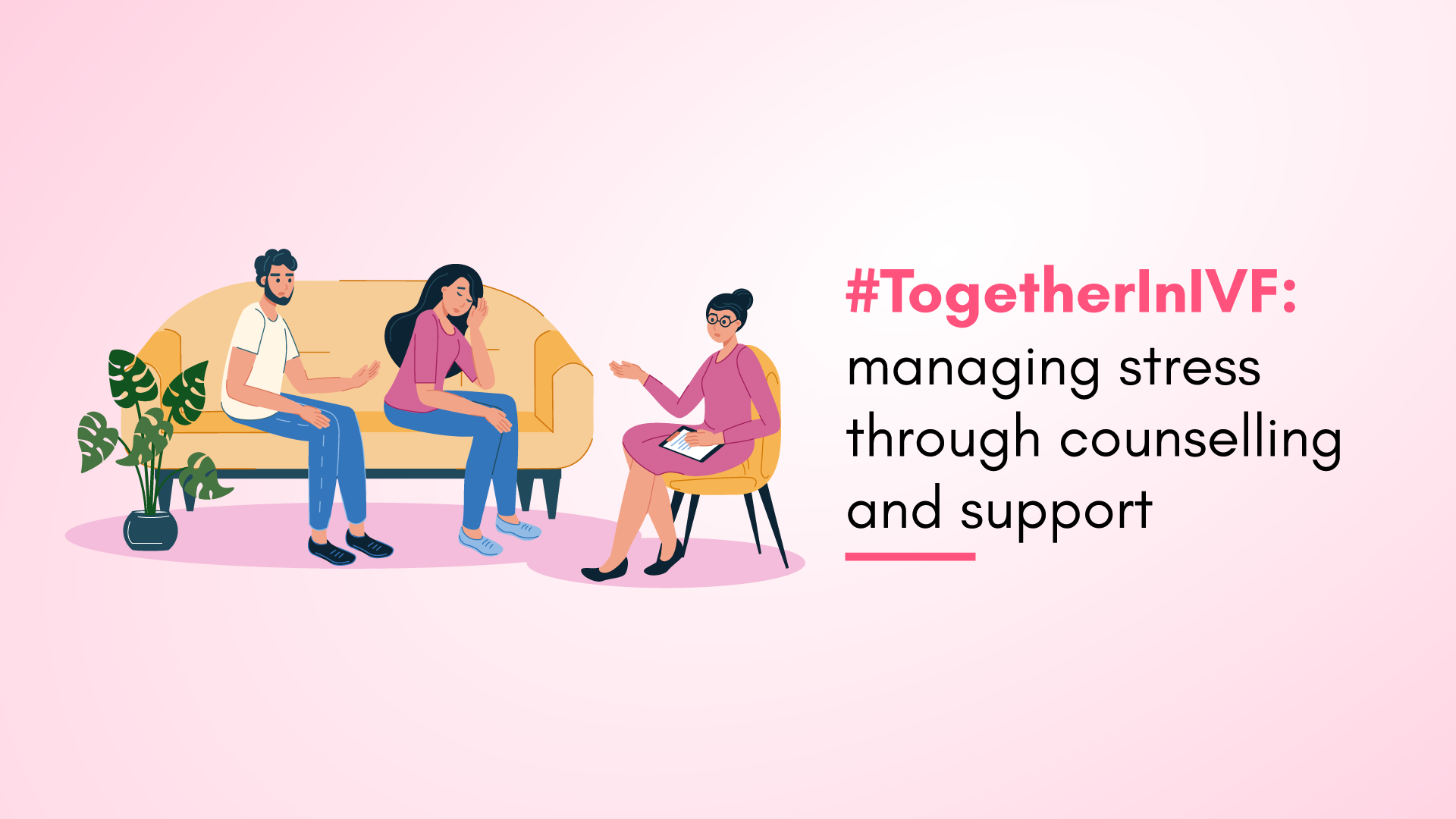#TogetherInIVF: Managing Stress through Counselling and Support
The journey of in vitro fertilisation (IVF) can be an emotional rollercoaster, filled with a myriad of feelings ranging from hope and excitement to anxiety and frustration. While the prospect of starting a family through IVF is undoubtedly exhilarating, the process itself can be physically and emotionally taxing. The stress associated with fertility treatments can have a significant impact on an individual's well-being, making it crucial to seek professional support and counselling to navigate this challenging path.
Stress and Fertility: The Impact on IVF
Stress is a natural response of a human being to the demands and uncertainties of life, and the IVF process is no exception. Higher than normal levels of continuous stress can have a detrimental effect on fertility, potentially hindering the success of IVF treatments. Research has shown that stress can disrupt the delicate hormonal balance required for ovulation and embryo implantation, lowering the chances of a successful pregnancy.
Also read: Can Music Improve Embryo Implantation?
IVF Experience: Emotional Ups and Downs
From the initial doubt, fear, or excitement of starting IVF treatment to the disappointment of a failed cycle, the emotional toll can be overwhelming. Feelings of anxiety, sadness, and frustration are common as individuals grapple with the uncertainties and challenges that come with each step of the process.
IVF Success
While the ultimate goal of IVF is to achieve a successful pregnancy, the journey itself can be emotionally draining. Even when a cycle results in a positive outcome, the joy of pregnancy can be accompanied by worries and concerns about the health of the baby and the potential for complications. Effectively managing these emotions is crucial for maintaining overall wellness and increasing the chances of a positive outcome.
When Should You Consult an Infertility Counsellor?
Seeking the guidance of an infertility counsellor can be beneficial at any stage of the IVF process. However, there are certain situations where professional support may be particularly valuable:
- Before Starting IVF: Counselling can help individuals and couples prepare emotionally and mentally for the challenges ahead, setting realistic expectations and developing coping strategies.
- During IVF Treatment: The emotional strain of undergoing fertility treatments can be overwhelming. Counselling builds a safe space to express feelings, manage stress, and develop healthy coping mechanisms.
- After a Failed Cycle: The disappointment of a failed IVF cycle can be devastating. Counselling can help individuals process their emotions, grieve the loss, and decide on the next steps in their fertility journey.
- When Experiencing Relationship Strain: The stress of IVF can strain relationships. Counselling can help couples communicate effectively, resolve conflicts, and maintain a strong support system.
Benefits of Counselling for IVF Patients
Professional Support for Managing Stress:
One of the primary benefits of counselling during the IVF process is the professional support it provides in managing stress. A skilled counsellor can help individuals identify and address the sources of stress, develop effective coping strategies, and maintain a healthy emotional balance throughout the journey.
Help to Cope with the Emotional Aftermath:
IVF can be emotionally draining, regardless of the outcome. Counselling can provide invaluable support in coping with the emotional aftermath, whether it involves processing the grief of a failed cycle or adjusting to the new reality of pregnancy and parenthood.
Improve Success Rate:
By addressing the emotional, psychological and financial factors that can impact fertility, counselling has been shown to improve the success of IVF. Reducing stress levels and developing effective coping mechanisms can build a more favourable environment for conception and implantation.
Better Ways to Cope With IVF Anxiety Attacks:
Anxiety is a common experience during the IVF process, and counselling can equip individuals with better ways to cope with anxiety attacks. Techniques such as cognitive-behavioural therapy, mindfulness, and relaxation exercises can be invaluable in managing anxiety and promoting overall well-being.
Reduces IVF Depression:
The emotional rollercoaster of IVF can sometimes lead to feelings of depression. Counselling can help individuals identify and address these feelings, providing support and guidance in developing healthy coping mechanisms and, if necessary, seeking additional professional help.
Overcome IVF Pregnancy Anxiety:
Even after achieving a successful pregnancy through IVF, many individuals experience heightened anxiety and worry. Counselling can help individuals address these concerns, develop strategies for managing stress, and embrace the joys of pregnancy and parenthood.
Reduces Stress After IVF Transfer:
The days and weeks following an embryo transfer can be particularly stressful as individuals anxiously await the outcome. Counselling can provide valuable techniques for managing this stress, such as relaxation exercises, mindfulness practices, and strategies for maintaining a positive mindset.
Helps in Reducing IVF Stress on Marriage:
The stress of IVF can strain even the strongest relationships. Counselling can help couples navigate this challenging time by improving communication, fostering understanding, and providing tools for maintaining a strong and supportive partnership.
Also read: How Ferty9's Fertility Counseling Services Address Your Specific Needs?
Techniques for Managing Stress during IVF Treatment
While counselling is an invaluable resource, there are also various techniques individuals can incorporate into their daily lives to help manage stress during the IVF process:
Mindfulness and Meditation:
Mindfulness practices, like meditation, deep breathing exercises, and mindful movement, can help individuals cultivate a sense of calm and presence, lowering stress and anxiety levels.
Exercise and Physical Activity:
Regular mild to moderate-intensity physical activity has been shown to have numerous advantages for managing stress, including releasing endorphins, improving sleep, and promoting overall well-being.
Support Networks and Counselling:
Strong support from family, friends, and fellow IVF patients can provide a sense of community and understanding. Seeking professional counselling can also offer invaluable guidance and support throughout the journey
Healthy Lifestyle Choices:
Maintaining a balanced diet, getting adequate rest, and engaging in stress-relieving activities like yoga, journaling, or listening to music can all help lower stress levels and promote overall well-being.
Relaxation Techniques:
Techniques such as progressive muscle relaxation, visualisation exercises, and aromatherapy can help individuals achieve a state of calm and relaxation, counteracting the effects of stress.
Suggested Read: Advanced IVF Fertility Labs: What’s New at Ferty9?
Conclusion
The IVF journey is a deeply personal and emotional experience that is filled with challenges and triumphs. While this process can be physically and emotionally taxing, seeking professional support and counselling can provide invaluable guidance and tools for managing stress and promoting overall well-being. By embracing techniques for stress management and fostering a strong support network, individuals can navigate the ups and downs of IVF with greater resilience and a heightened sense of empowerment.
If you or someone you know is struggling with the emotional challenges of the IVF journey, we encourage you to reach out to our team of experienced fertility counsellors. Our compassionate professionals are dedicated to providing the support and guidance you need to navigate this path with confidence and resilience. Visit our website or call us today to schedule an appointment and take the first step towards conquering the emotional rollercoaster of fertility treatments.

Write your message
FAQ's
Why is managing stress critical during the IVF process?
What are some common signs that I might need IVF counselling?
Some common signs that you might benefit from IVF counselling include:
- Experiencing overwhelming feelings of anxiety, sadness, or frustration
- Struggling to cope with the emotional ups and downs of the IVF process
- Feeling isolated or unsupported
- Experiencing relationship strain or communication issues with your partner
- Difficulty managing stress or developing healthy coping mechanisms


